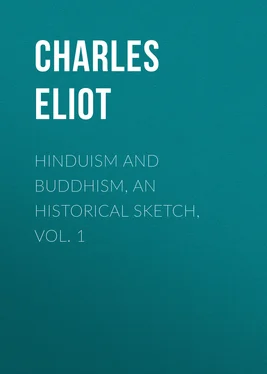Charles Eliot - Hinduism and Buddhism, An Historical Sketch, Vol. 1
Здесь есть возможность читать онлайн «Charles Eliot - Hinduism and Buddhism, An Historical Sketch, Vol. 1» — ознакомительный отрывок электронной книги совершенно бесплатно, а после прочтения отрывка купить полную версию. В некоторых случаях можно слушать аудио, скачать через торрент в формате fb2 и присутствует краткое содержание. Жанр: foreign_religion, Философия, Религиозная литература, foreign_psychology, foreign_antique, foreign_prose, на английском языке. Описание произведения, (предисловие) а так же отзывы посетителей доступны на портале библиотеки ЛибКат.
- Название:Hinduism and Buddhism, An Historical Sketch, Vol. 1
- Автор:
- Жанр:
- Год:неизвестен
- ISBN:нет данных
- Рейтинг книги:5 / 5. Голосов: 1
-
Избранное:Добавить в избранное
- Отзывы:
-
Ваша оценка:
- 100
- 1
- 2
- 3
- 4
- 5
Hinduism and Buddhism, An Historical Sketch, Vol. 1: краткое содержание, описание и аннотация
Предлагаем к чтению аннотацию, описание, краткое содержание или предисловие (зависит от того, что написал сам автор книги «Hinduism and Buddhism, An Historical Sketch, Vol. 1»). Если вы не нашли необходимую информацию о книге — напишите в комментариях, мы постараемся отыскать её.
Hinduism and Buddhism, An Historical Sketch, Vol. 1 — читать онлайн ознакомительный отрывок
Ниже представлен текст книги, разбитый по страницам. Система сохранения места последней прочитанной страницы, позволяет с удобством читать онлайн бесплатно книгу «Hinduism and Buddhism, An Historical Sketch, Vol. 1», без необходимости каждый раз заново искать на чём Вы остановились. Поставьте закладку, и сможете в любой момент перейти на страницу, на которой закончили чтение.
Интервал:
Закладка:
Most Europeans consider man as the centre and lord of the world or, if they are very religious, as its vice-regent under God. He may kill or otherwise maltreat animals for his pleasure or convenience: his task is to subdue the forces of nature: nature is subservient to him and to his destinies: without man nature is meaningless. Much the same view was held by the ancient Greeks and in a less acute form by the Jews and Romans. Swinburne's line
Glory to man in the highest, for man is the master of things
is overbold for professing Christians but it expresses both the modern scientific sentiment and the ancient Hellenic sentiment.
But such a line of poetry would I think be impossible in India or in any country to the East of it. There man is thought of as a part of nature not its centre or master 57 57 The sense of human dignity was strongest among the early Buddhists. They (or some sects of them) held that an arhat is superior to a god (or as we should say to an angel) and that a god cannot enter the path of salvation and become an arhat.
. Above him are formidable hosts of deities and spirits, and even European engineers cannot subdue the genii of the flood and typhoon: below but still not separated from him are the various tribes of birds and beasts. A good man does not kill them for pleasure nor eat flesh, and even those whose aspirations to virtue are modest treat animals as humble brethren rather than as lower creatures over whom they have dominion by divine command.
This attitude is illustrated by Chinese and Japanese art. In architecture, this art makes it a principle that palaces and temples should not dominate a landscape but fit into it and adapt their lines to its features. For the painter, flowers and animals form a sufficient picture by themselves and are not felt to be inadequate because man is absent. Portraits are frequent but a common form of European composition, namely a group of figures subordinated to a principal one, though not unknown, is comparatively rare.
How scanty are the records of great men in India! Great buildings attract attention but who knows the names of the architects who planned them or the kings who paid for them? We are not quite sure of the date of Kâlidâsa, the Indian Shakespeare, and though the doctrines of Śankara, Kabir, and Nânak still nourish, it is with difficulty that the antiquary collects from the meagre legends clinging to their names a few facts for their biographies. And Kings and Emperors, a class who in Europe can count on being remembered if not esteemed after death, fare even worse. The laborious research of Europeans has shown that Asoka and Harsha were great monarchs. Their own countrymen merely say "once upon a time there was a king" and recount some trivial story.
In fact, Hindus have a very weak historical sense. In this they are not wholly wrong, for Europeans undoubtedly exaggerate the historical treatment of thought and art 58 58 Cf. Bosanquet, Gifford Lectures , 1912, p. 78. "History is a hybrid form of experience incapable of any considerable degree of being or trueness. The doubtful story of successive events cannot amalgamate with the complete interpretation of the social mind, of art, or of religion. The great things which are necessary in themselves, become within the narrative contingent or ascribed by most doubtful assumptions of insight to this actor or that on the historical stage. The study of Christianity is the study of a great world experience: the assignment to individuals of a share in its development is a problem for scholars whose conclusions, though of considerable human interest, can never be of supreme importance."
. In science, most students want to know what is certain in theory and useful in practice, not what were the discarded hypotheses and imperfect instruments of the past. In literature, when the actors and audience are really interested, the date of Shakespeare and even the authorship of the play cease to be important 59 59 The Chinese critic Hsieh Ho who lived in the sixth century of our era said: "In Art the terms ancient and modern have no place." This is exactly the Indian view of religion.
. In the same way Hindus want to know whether doctrines and speculations are true, whether a man can make use of them in his own religious experiences and aspirations. They care little for the date, authorship, unity and textual accuracy of the Bhagavad-gîtâ. They simply ask, is it true, what can I get from it? The European critic, who expects nothing of the sort from the work, racks his brains to know who wrote it and when, who touched it up and why?
The Hindus are also indifferent to the past because they do not recognize that the history of the world, the whole cosmic process, has any meaning or value. In most departments of Indian thought, great or small, the conception of [Greek: telos or purpose is absent, and if the European reader thinks this a grave lacuna, let him ask himself whether satisfied love has any [Greek: telos. For Hindus the world is endless repetition not a progress towards an end. Creation has rarely the sense which it bears for Europeans. An infinite number of times the universe has collapsed in flaming or watery ruin, aeons of quiescence follow the collapse and then the Deity (he has done it an infinite number of times) emits again from himself worlds and souls of the same old kind. But though, as I have said before, all varieties of theological opinion may be found in India, he is usually represented as moved by some reproductive impulse rather than as executing a plan. Śankara says boldly that no motive can be attributed to God, because he being perfect can desire no addition to his perfection, so that his creative activity is mere exuberance, like the sport of young princes, who take exercise though they are not obliged to do so.
Such views are distasteful to Europeans. Our vanity impels us to invent explanations of the Universe which make our own existence important and significant. Nor does European science altogether support the Indian doctrine of periodicity. It has theories as to the probable origin of the solar system and other similar systems, but it points to the conclusion that the Universe as a whole is not appreciably affected by the growth or decay of its parts, whereas Indian imagination thinks of universal cataclysms and recurring periods of quiescence in which nothing whatever remains except the undifferentiated divine spirit.
Western ethics generally aim at teaching a man how to act: Eastern ethics at forming a character. A good character will no doubt act rightly when circumstances require action, but he need not seek occasions for action, he may even avoid them, and in India the passionless sage is still in popular esteem superior to warriors, statesmen and scientists.
15. Eastern Polytheism
Different as India and China are, they agree in this that in order not to misapprehend their religious condition we must make our minds familiar with a new set of relations. The relations of religion to philosophy, to ethics, and to the state, as well as the relations of different religions to one another, are not the same as in Europe. China and India are pagan, a word which I deprecate if it is understood to imply inferiority but which if used in a descriptive and respectful sense is very useful. Christianity and Islam are organized religions. They say (or rather their several sects say) that they each not only possess the truth but that all other creeds and rites are wrong. But paganism is not organized: it rarely presents anything like a church united under one head: still more rarely does it condemn or interfere with other religions unless attacked first. Buddhism stands between the two classes. Like Christianity and Islam it professes to teach the only true law, but unlike them it is exceedingly tolerant and many Buddhists also worship Hindu or Chinese gods.
Читать дальшеИнтервал:
Закладка:
Похожие книги на «Hinduism and Buddhism, An Historical Sketch, Vol. 1»
Представляем Вашему вниманию похожие книги на «Hinduism and Buddhism, An Historical Sketch, Vol. 1» списком для выбора. Мы отобрали схожую по названию и смыслу литературу в надежде предоставить читателям больше вариантов отыскать новые, интересные, ещё непрочитанные произведения.
Обсуждение, отзывы о книге «Hinduism and Buddhism, An Historical Sketch, Vol. 1» и просто собственные мнения читателей. Оставьте ваши комментарии, напишите, что Вы думаете о произведении, его смысле или главных героях. Укажите что конкретно понравилось, а что нет, и почему Вы так считаете.












